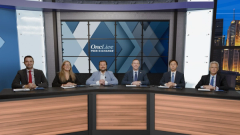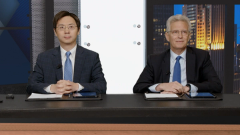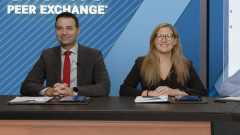
Management of Diffuse Large B-Cell Lymphoma: Data From ASCO 2023
Key opinion leaders reflect on data from the 2023 ASCO meeting and how it may impact the management of diffuse large B-cell lymphoma.
Episodes in this series

Transcript:
Matthew A. Lunning, DO, FACP: I’m going to open this to all the faculty as we wind down. We’re all in Chicago for ASCO [American Society of Clinical Oncology Annual Meeting] 2023. What were some recent updates that caught your eye? We’ll start with you, Dr Flinn.
Ian W. Flinn, MD, PhD: I continue to be excited and impressed by the bispecific literature across the field. Getting away from cytotoxic chemotherapy, all the things that we’ve talked about, and getting to a more immunologically based approach makes all the sense in the world. We’ve seen it in follicular lymphoma. Now we see a drug approved for relapsed large cell lymphoma, which is exciting. Then [we need to] figure out how to use them effectively. Whether it’s as a single agent or in combination with other agents, I suspect we’re going to go down the accommodation route. That’s where I’m looking for the future.
Matthew A. Lunning, DO, FACP: Are we going to be back to the CLL [chronic lymphocytic leukemia] days of time-limited therapy vs time-continuous therapy? Are we going to have that for a little while, and then it’s going to stop? What’s your thoughts on that?
Ian W. Flinn, MD, PhD: I’ve gone through a bit of a change in my own thinking on this. First, I thought, it’s bad large cell lymphoma, so why would you stop a drug? Why wouldn’t you just keep it going? If it’s working, don’t mess with it. On the other hand, I’m taken by the notion that if you fix it once, you don’t need to fix it again. A time-limited therapy seems attractive. Maybe there’s room for more than 1 approach. Think about patients with CLL. Some pick continuous therapy, others time limited. Maybe different individuals will pick different things.
Matthew Lunning, DO, FACP: Dr Wang, give us your thoughts on anything you saw at ASCO.
Yucai Wang, MD, PhD: I share excitement on bispecific antibodies. In particular, we’re seeing bispecific antibodies moving to the front line. We have epcoritamab combined with standard chemotherapy. We’re going to have glofitamab moving to the front line combining with the FLOX [leucovorin, oxaliplatin] regimen. Those are exciting trials to watch as we try to push the envelope and improve the frontline therapy efficacy.
Matthew Lunning, DO, FACP: Dr Westin?
Jason Westin, MD, MS, FACP: I’m going to go back to tafasitamab in the front line. This isn’t from ASCO 2023, so my apologies for changing the answer slightly. Tafasitamab in the front line appears to be very promising. We have a study that’s actively enrolling at [The University of Texas] MD Anderson [Cancer Center], called Smart Stop, where we’re doing tafasitamab-lenalidomide plus Rituxan and acalabrutinib in patients who are newly diagnosed. Studies are ongoing, but results look promising. Building on our prior Smart Start trial, we’ve seen higher CR [complete remission] rates so far. It’s ongoing.
To come back to the ASCO 2023 data, I echo my colleagues. Bispecifics get more attention as time goes on, and they ultimately will be in combinations. Finding the right dance partner is going to be the most important thing. It’s logical to pair them with frontline chemotherapy because that’s the paradigm of taking CHOP [cyclophosphamide, hydroxydaunorubicin hydrochloride, vincristine, prednisone] and adding to it. It’s a little inelegant to use their mechanism of action in the best possible way because you’re using Cytoxan, which we use as lympho-depleting chemotherapy prior to CAR [chimeric antigen receptor] T-cell [therapy] and then giving an agent that requires a T cell to be active. I’m looking forward more to the biologically based combinations for bispecifics.
Matthew Lunning, DO, FACP: What’s the first drug to go in CHOP [cyclophosphamide, hydroxydaunorubicin hydrochloride, vincristine, prednisone]? We’ve already seen vincristine go away, but is Cytoxan next because of your rationale? You’re already doing it in some of your trials where you’re getting out the whittling knife.
Jason Westin, MD, MS, FACP: I don’t take the approach of incrementally taking 1 drug off at a time. Save those for patients who don’t respond to something else. CHOP [cyclophosphamide, hydroxydaunorubicin hydrochloride, vincristine, prednisone] may have a role to play for certain subsets of patients. We’ve already seen in IPI [International Prognostic Index] 2 to 5 that vincristine didn’t matter much. If you take that out and put in a better version of that drug, an antibody-drug conjugate, which can’t have more toxicities, we’ll see if that strategy holds. There may be patients who could be effectively cured without having an anthracycline in the first line. That’s a controversial statement, but the only way we find out is beginning to test that, and we’re doing that in some of the older patients. Some of these studies are looking at a bispecific or a bispecific plus antibody-drug conjugate. For example, the LOTIS-9 trial is for patients who are unfit for chemotherapy using Rituxan and loncastuximab. These studies are beginning to move the field forward by not saving our best drugs for third or fourth line but testing them in those earliest patients. I’m glad that the Smart Start trial showed that it was feasible and safe. Now we can dive in and test that in larger patient populations.
Matthew A. Lunning, DO, FACP: That appears to be very wise. Dr Rhodes, what are your thoughts on things that tickled your neurons at ASCO 2023?
Joanna M. Rhodes, MD, MSCE: I echo what my colleagues have said. Bispecifics are very exciting, and seeing how those combinations are going to play out is exciting. I also wonder if sticking a bispecific with CHOP [cyclophosphamide, hydroxydaunorubicin hydrochloride, vincristine, prednisone] is the best thing. It’s probably going to be the way we start. My hope is that we don’t kill the idea of bispecifics in the frontline setting if these trials don’t end up being positive, because we’ve done a lot of R-CHOP [rituximab, cyclophosphamide, hydroxydaunorubicin hydrochloride, vincristine, prednisone] plus X over time, and most of those trials have unfortunately been negative.
Matthew A. Lunning, DO, FACP: Dr Saeed, anything else at ASCO?
Hayder M. Saeed, MD: It’s hard to add to the great opinions about ASCO, but I want to point out the other options we have in the shorter term. It was interesting to see some of the other studies, such as zanubrutinib-lenalidomide in the relapsed setting. This builds on the easy regimen for patients who aren’t in good performance status and don’t have CAR T-cell therapy available. It could be an option for them, although the results aren’t stronger than what we’ve seen with tafasitamab-lenalidomide. Actually, they’re on the lower end of the response rate. We’re working on some other collaborative group studies to build on the backbone of tafasitamab-lenalidomide and see if we can use some biologically driven targeted therapy with addition of other agents, such as zanubrutinib or trastuzumab, to this regimen to see if that would improve the outcome of those patients.
Transcript edited for clarity.










































